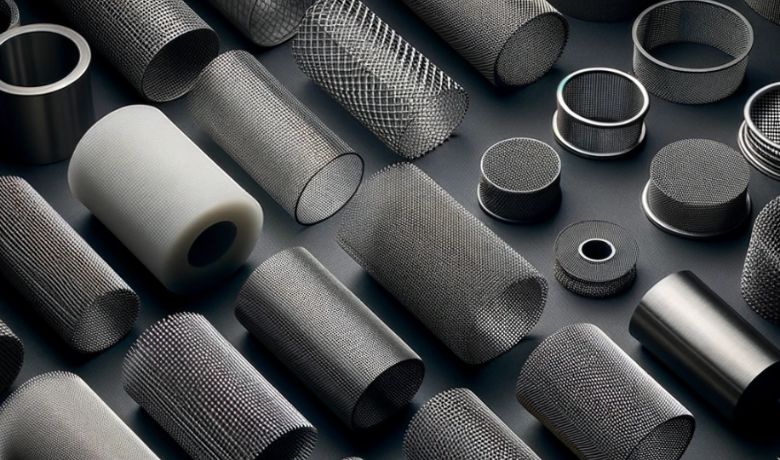-
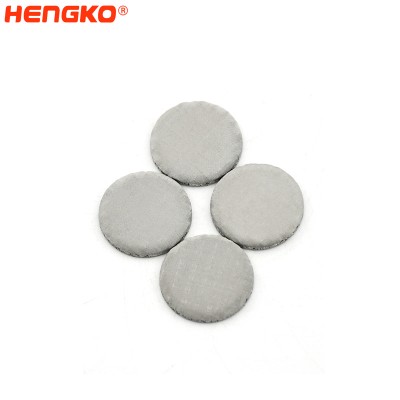
Catalyst Filtration with Leaf Filters Sintered Metal Mesh Filter Disc for the Recovery ...
HENGKO manufactures filter elements in a broad range of materials, sizes, and fittings so they can be easily specified with the characteristics and configura...
View Detail -
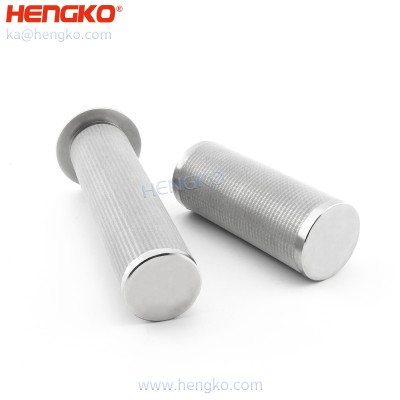
customized stainless steel 316 316L wire mesh tube / cartridge filter used for medical ...
HENGKO sintered wire mesh tube/cartridge filters are usually used for purification and filtration of liquid and gas, separation and recovery of solid particl...
View Detail -
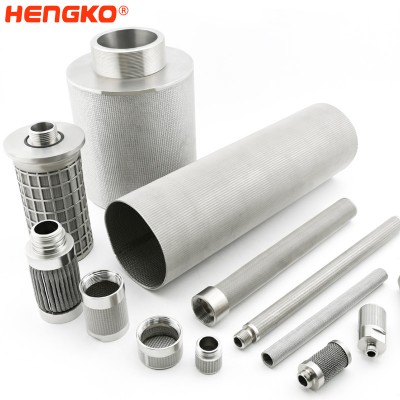
Customized medical 304 316 316L stainless steel filter mesh cartridges from HENGKO
Made of a multi-layer sintered 316 or 304 stainless steel strainer, it has the properties of heat resistance, pressure resistance, and corrosion resistance.T...
View Detail -
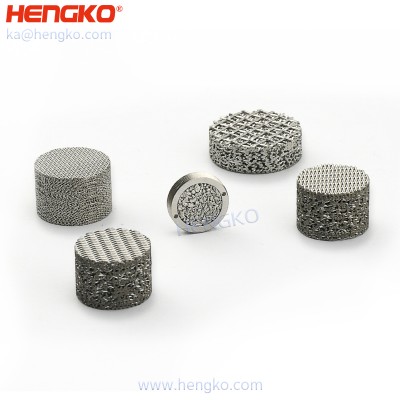
Medical grade micron stainless steel 316 316L wire mesh multi-layer plate / disc filter...
HENGKO sintered wire mesh filters have 5 sintered wire mesh layers with self-supporting construction for high mechanical strength and high-temperature resist...
View Detail -
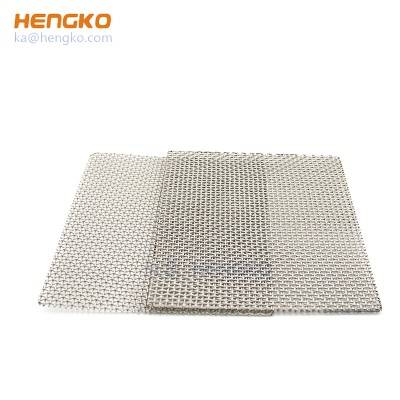
Wholesale medical grade micron stainless steel 316 SS wire mesh filter for pharmaceutic...
HENGKO medical grade stainless steel filters are usually used for purification and filtration of liquid and gas, separation and recovery of solid particles, ...
View Detail -
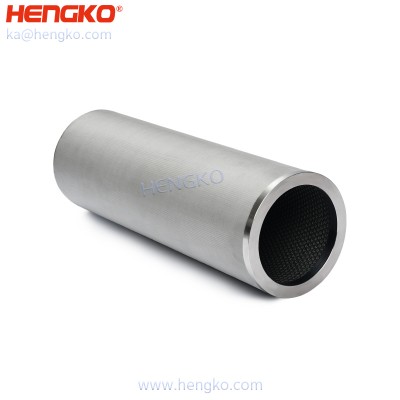
High pressure resistant 316l sintered stainless steel wire mesh filter cartridge
Sinter wire mesh filters are usually used for purification and filtration of liquid and gas, separation and recovery of solid particle, transpiration cooling...
View Detail -
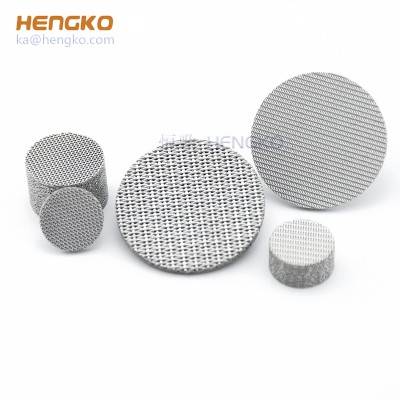
Stainless steel sintering wire mesh screen filter element for coffee filter or air cond...
HENGKO manufactures filter elements in a broad range of materials, sizes, and fittings so they can be easily specified with the characteristics and configura...
View Detail -
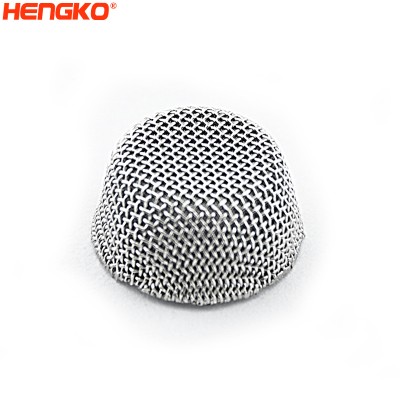
sintered stainless steel wire mesh air filter cartridge for dust removal or pure water
Sinter wire mesh filters are usually used for purification and filtration of liquid and gas, separation and recovery of solid particles, transpiration coolin...
View Detail -
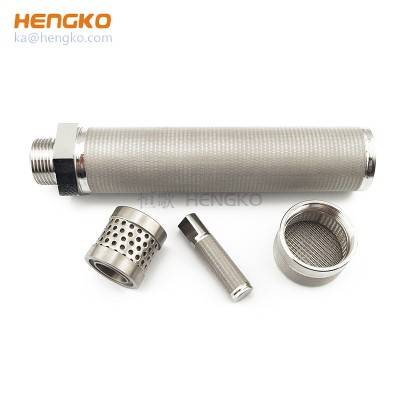
Sintered seamless stainless steel 304/316L wire mesh filter pipe for filtration system
Sinter wire mesh filters are usually used for purification and filtration of liquid and gas, separation and recovery of solid particles, transpiration coolin...
View Detail -
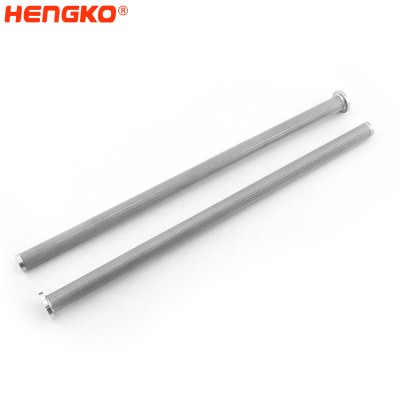
Customized 304/316L sintered stainless steel wire mesh filter for industry & Lab f...
Sinter wire mesh filters are usually used for purification and filtration of liquid and gas, separation and recovery of solid particles, transpiration coolin...
View Detail -
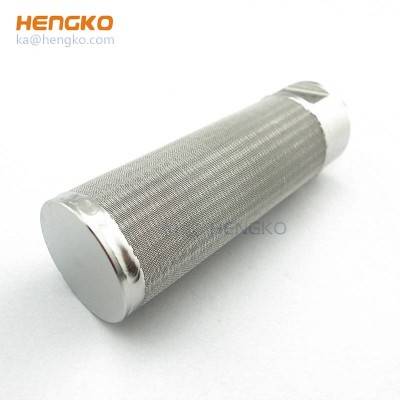
90 100 Micron sintered porous metal stainless steel filter cylinder wire mesh strainer,...
Sinter wire mesh filters are usually used for purification and filtration of liquid and gas, separation and recovery of solid particles, transpiration coolin...
View Detail -
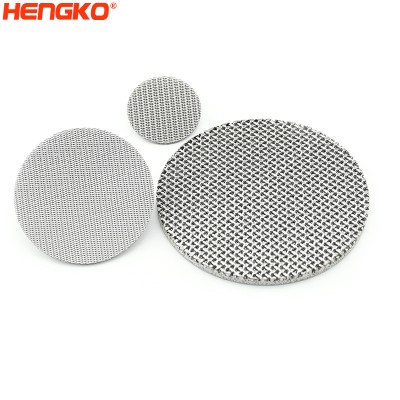
2 5 50 100 150 300 Microns porous 304 316L SS stainless steel wire sintered mesh filter...
The stainless steel sintered mesh is made of stainless steel woven mesh, and the argon-arc welding process joins the sealing surfaces of the filter element. ...
View Detail -
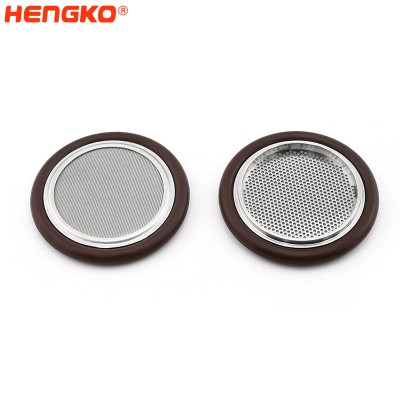
Round 25 50 100 micron sintered stainless steel wire mesh filter disc
HENGKO sintered disc filters consist of highly uniform, interconnected networks of pores with tortuous paths that trap solid particles in gas or liquid. Exce...
View Detail -
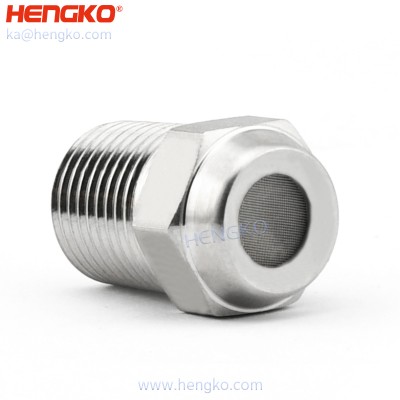
Customizable oil or air filtration stainless steel mesh filter bleeder orifice valve
HENGKO sintered wire mesh filters are usually used for purification and filtration of liquid and gas, separation and recovery of solid particles, transpirati...
View Detail -
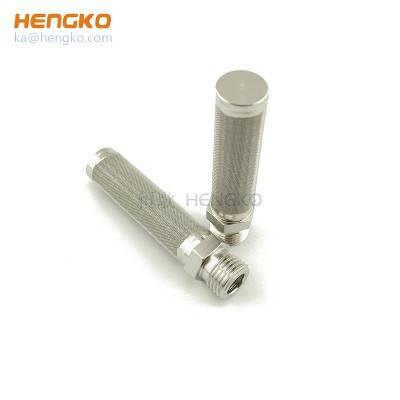
40 micron sintered 316L stainless steel oil filter cylinder mesh/powder element
Sintered wire mesh filters are usually used for purification and filtration of liquid and gas, separation and recovery of solid particles, transpiration cool...
View Detail -
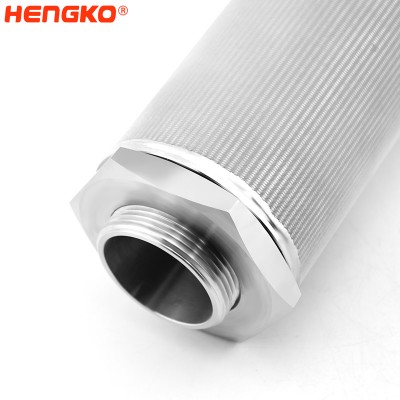
Reusable Resists High Temperature Microns Mesh Sintering Metal Filter Cartridge
Sinter wire mesh filters are usually used for purification and filtration of liquid and gas, separation and recovery of solid particles, transpiration coolin...
View Detail -
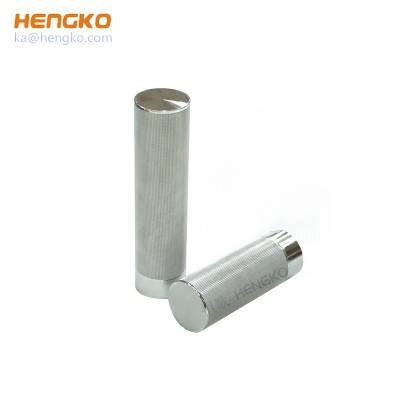
Candle type Sintered 316L stainless steel mesh filter reusable cartridge
HENGKO offers an extensive collection of stainless steel filter cartridges that are tailored for use in a broad range of industries, including petrochemicals...
View Detail -
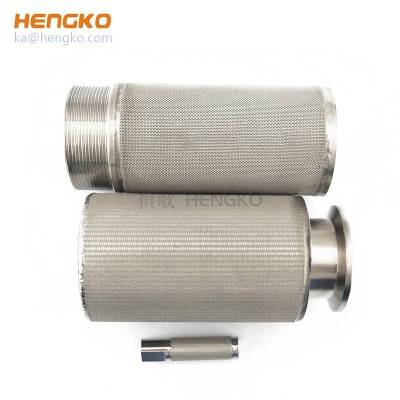
Customized micron sintered porous metal stainless steel cylinder mesh filter tube for o...
Sinter wire mesh filters are usually used for purification and filtration of liquid and gas, separation and recovery of solid particles, transpiration coolin...
View Detail -
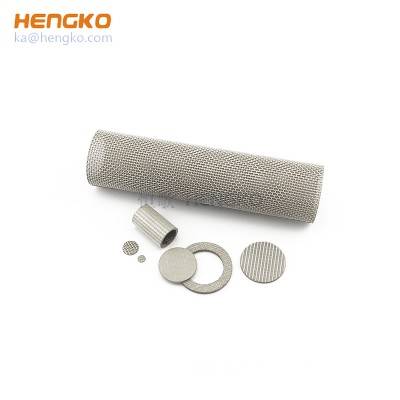
Sintered 5 10 40 100 microns porous 316L stainless steel filter wire mesh for dust filter
Sinter wire mesh filters are usually used for purification and filtration of liquid and gas, separation and recovery of solid particles, transpiration coolin...
View Detail -
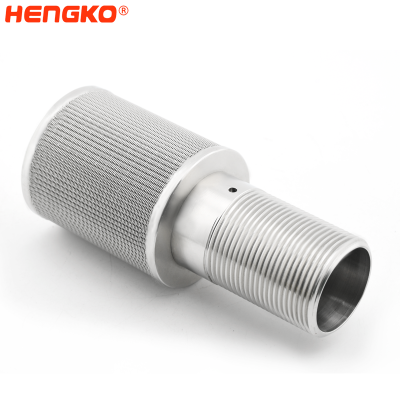
5 40 micron sintered stainless steel porous metal fuel oil/air/dust filter wire mesh ca...
Sinter wire mesh filters are usually used for purification and filtration of liquid and gas, separation and recovery of solid particles, transpiration coolin...
View Detail
What is sintered mesh?
Simple to say, A sintered mesh is a metal filter made by fusing together multiple layers of woven wire mesh
through a process called sintering.
During sintering, the mesh layers are heated and pressed together, creating a strong and stable structure.
The resulting product has uniform pore sizes and offers excellent filtration capabilities, making it suitable for
various applications in industries where precise and reliable filtration is required.
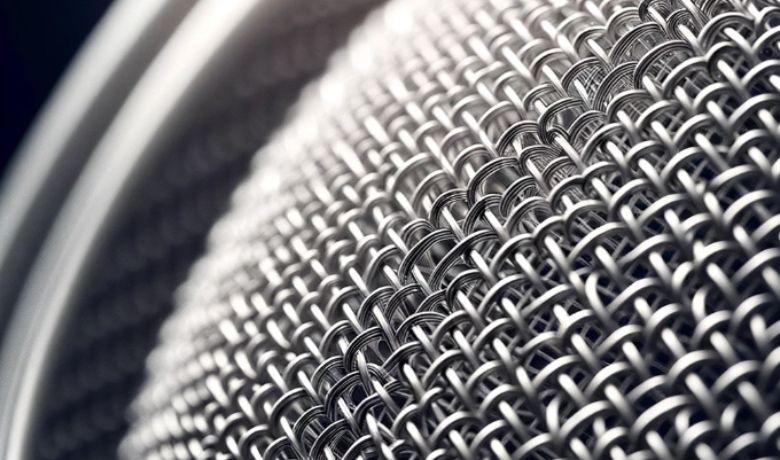
Why Use Sintered Stainless Steel Mesh?
Sintered stainless steel mesh offers several advantages that make it an ideal choice for various industrial applications:
1.Durability:
Sintered stainless steel is highly resistant to corrosion, making it suitable for harsh environments and extended use.
2.High Filtration Efficiency:
The sintering process creates a uniform pore structure that allows for effective filtration of particles, providing high filtration efficiency for both liquids and gases.
3.Customizable Pore Sizes:
Manufacturers can create sintered meshes with various pore sizes to meet specific filtration requirements, making them versatile for different applications.
4.Mechanical Strength:
Sintered stainless steel mesh is robust and can withstand high pressures, temperatures, and flow rates without deforming.
5.Easy to Clean:
These meshes can be cleaned using various methods (e.g., backflushing, ultrasonic cleaning), which extends their lifespan and maintains performance.
6.Chemical Resistance:
They can handle a wide range of chemicals, making them suitable for use in chemical processing, food and beverage, and pharmaceutical industries.
7.Non-toxic and Safe:
Being made from stainless steel, they are non-toxic and do not leach harmful substances into processed materials.
8.Cost-Effectiveness:
While the initial investment may be higher, the durability and reusability of sintered stainless steel mesh can lead to long-term cost savings.
9.Applications in Diverse Industries:
They are used in various fields, including water treatment, oil and gas, pharmaceuticals, and food processing, due to their versatility and reliability.
These characteristics make sintered stainless steel mesh an excellent choice for industries that require high-performance filtration solutions.
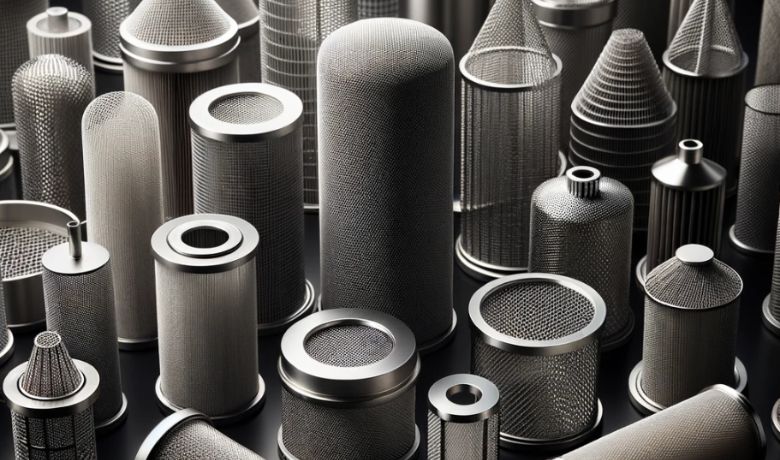
Types of Sintered Mesh Filter ?
Sintered mesh filters come in various types based on their structure, layers, and specific applications. Some of the common types include:
1. Single Layer Sintered Mesh:
Made from a single layer of woven wire mesh that has been sintered to enhance its strength and rigidity.
2. Multi-layer Sintered Mesh:
This involves stacking several layers of woven wire mesh and then sintering them together. The multi-layer structure boosts mechanical strength and filtration accuracy.
3. Sintered Square Woven Mesh:
Made from square woven wire mesh layers sintered together, this type offers uniform pore sizes and is commonly used in various filtration applications.
4. Dutch Woven Sintered Mesh:
This combines multiple layers of Dutch woven wire meshes, which are then sintered. The result is a filter with fine filtration capabilities.
5. Perforated Metal Sintered Mesh:
This type combines one or more layers of woven wire mesh with a layer of perforated metal. The perforated metal provides added strength, while the wire mesh layers offer filtration.
6. Sintered Fiber Felt Mesh:
Instead of woven wire, this filter uses a mat of metal fibers. The fibers are sintered together to create a porous medium that's excellent for high-temperature and high-viscosity applications.
7. Sintered Metal Powder Mesh:
This type is created by sintering metal powders to form a porous filtration medium. It's often used when fine filtration and high dirt holding capacities are needed.
Each of these types has its advantages and is designed for specific applications. When choosing a sintered mesh filter, it's crucial to consider the nature of the substance being filtered, the desired pore size, operating conditions, and other relevant factors.
How to Choose Right Sintered Mesh Filters for Your Filtration Device ?
Choosing the right sintered mesh filter for your filtration device is crucial for optimal performance. Here's a step-by-step guide to help you make an informed decision:
1. Determine Filtration Requirements:
*Particle Size: Understand the smallest particle size you need to filter out. This will guide you to select the right pore size of the sintered mesh.
* Flow Rate: Consider the desired flow rate through the filter. Some mesh types allow faster flow rates without compromising filtration efficiency.
2. Assess Operating Conditions:
Temperature: Ensure the chosen sintered mesh can withstand the operating temperatures of your process.
Pressure: Some filtration processes involve high pressures. Choose a mesh that can handle these pressures without deforming.
Chemical Compatibility: Ensure the material of the mesh is compatible with the substances being filtered, especially if chemicals or corrosive materials are involved.
3. Material Selection:
Stainless steel is the most common material for sintered mesh due to its durability and resistance to corrosion. However, other materials like titanium or Monel might be more suitable for specific applications.
4. Select the Type of Sintered Mesh:
Single Layer vs. Multi-layer: Multi-layer meshes provide higher strength and more precise filtration but might be overkill for some applications.
Woven vs. Non-Woven (Fiber Felt): While woven meshes offer uniform pore sizes, non-woven ones, like fiber felt, provide deeper filtration.
5.Consider Maintenance and Cleaning:
How often will you need to clean or replace the filter? Some sintered meshes can be easily backwashed, while others might require replacement after a certain period.
6. Check Filter Ratings:
Filtration efficiency, burst pressure rating, and permeability are vital ratings to consider. Ensure the chosen mesh meets or exceeds the required ratings for your application.
7. Consult with Manufacturers or Experts:
Engaging with a sintered mesh filter manufacturer or an expert can provide valuable insights. They can suggest specific products or custom solutions based on your requirements.
8. Cost Considerations:
While it's essential to get a filter that meets your needs, it's also crucial to balance quality with cost. Consider both initial investment and long-term operational costs.
9. Certifications and Quality Assurance:
Ensure the manufacturer adheres to quality standards like ISO certifications. This guarantees the reliability and effectiveness of the sintered mesh filters.
By carefully assessing your requirements and consulting with experts, you can choose the right sintered mesh filter that ensures both efficient filtration and longevity.
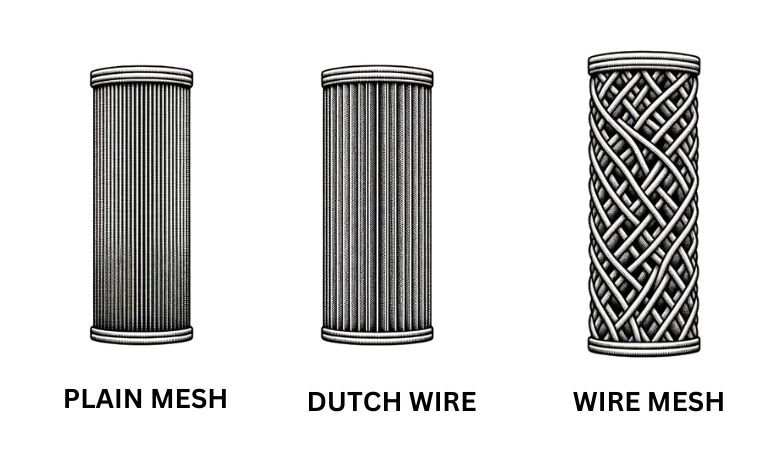
Sintered melt Mesh filter vs Sintered porous metal filter ?
Sintered melt mesh filters and sintered porous metal filters serve distinct purposes, although both are made through sintering processes.
Sintered Melt Mesh Filters:
*Structure: Comprised of woven metal wires that are sintered together to form a mesh.
*Application: Primarily used for filtration of larger particles and as a support medium for other filtration systems.
*Pore Size: Generally offers larger pore sizes suitable for coarse filtration.
*Strength: Provides good mechanical strength and is often used in applications where durability is crucial.
Sintered Porous Metal Filters:
*Structure: Made from sintered metal powders, resulting in a more uniform and interconnected pore structure.
*Application: Ideal for fine filtration and gas filtration, capable of capturing smaller particles.
*Pore Size: Can be engineered for specific pore sizes, allowing for precise filtration control.
*Versatility: Suitable for a wider range of applications, including liquid and gas filtration in various industries.
In summary, the choice between the two depends on the specific filtration requirements, such as particle size, flow rates, and application type.
Here we make a comparison table for sintered melt mesh filters and sintered porous metal filters:
| Feature | Sintered Melt Mesh Filter | Sintered Porous Metal Filter |
|---|---|---|
| Structure | Woven metal wires sintered together | Sintered metal powders |
| Application | Coarse filtration, support medium | Fine filtration, gas filtration |
| Pore Size | Larger pore sizes | Engineered for specific pore sizes |
| Strength | Good mechanical strength | High durability and resistance |
| Filtration Efficiency | Lower efficiency for small particles | High efficiency for small particles |
| Versatility | Limited to specific applications | Suitable for various industries |
| Maintenance | Easier to clean | Can be cleaned using multiple methods |
Application
Here are some popular applications of sintered mesh filters, along with detailed descriptions for each:
1. Pharmaceutical and Biotech Production:
* Description: In the pharmaceutical and biotech industries, product purity is paramount. Sintered mesh filters play a crucial role in ensuring this purity by removing impurities and contaminants. They're used in applications like sterile air filtration, venting, and cell culture media preparation. Their inert properties and ability to be sterilized make them ideal for these sensitive applications, ensuring product consistency and patient safety.
2. Petrochemical Processing:
* Description: The petrochemical industry processes various fluids, many of which are viscous or contain impurities. Sintered mesh filters effectively separate unwanted particles, enabling the production of high-quality fuels, lubricants, and other chemical products. Given their high-temperature and pressure resistance, these filters are also ideal for extreme processing conditions typical in this industry.
3. Food and Beverage Production:
* Description: Ensuring the cleanliness and safety of consumables is a top priority in food and beverage production. Sintered mesh filters assist in filtering out unwanted particles, bacteria, and other contaminants from liquids such as juices, wines, and syrups. They are also used in venting applications to ensure sterile air enters fermentation tanks or storage vessels.
4. Water Treatment:
* Description: Access to clean water is essential for both consumption and industrial processes. Sintered mesh filters aid in the removal of particulates, bacteria, and other contaminants from water sources, ensuring safe drinking water and effective wastewater treatment. Their corrosion resistance is particularly beneficial when filtering saline or chemically treated water.
5. Fluidized Beds in Chemical Processing:
* Description: Fluidized beds are used in various chemical processes where solid particles need to be suspended in a fluid. Sintered mesh filters ensure uniform airflow or fluid flow, making certain that particles are evenly suspended, which is crucial for consistent chemical reactions and product quality.
6. Aerospace and Automotive Filtration:
* Description: The aerospace and automotive industries require precision in every component, including filtration. Sintered mesh filters are employed in hydraulic systems, fuel systems, and ventilation applications. Their ability to withstand high pressures and resist corrosion makes them indispensable in these demanding environments.

7. Electronics and Semiconductor Manufacturing:
* Description: As technology advances, the need for ultra-pure water and air in electronics and semiconductor manufacturing becomes more critical. Sintered mesh filters help achieve this purity by filtering out sub-micron particles, ensuring that high-quality electronic components are produced.
8. Breather Vents in Equipment Enclosures:
* Description: Equipment enclosures, like those for electrical components or gearboxes, often need to 'breathe' to equalize pressure or release heat. Sintered mesh filters in breather vents ensure that while air passes through, contaminants like dust or moisture are kept out, protecting the equipment inside.
Each of these applications showcases the versatility and efficiency of sintered mesh filters, emphasizing their importance across a variety of industries.
FAQ
What are the common materials used for sintered mesh?
Common materials include stainless steel, nickel, titanium, bronze, and various polymers.
The choice of material depends on factors such as chemical compatibility, temperature resistance, and mechanical strength.
What are the advantages of sintered mesh filters?
Sintered mesh filters offer several advantages, including:
*High porosity and flow rate
*Excellent filtration efficiency
*Durability and long service life
*Resistance to corrosion and abrasion
*Customizable pore sizes for specific applications
Applications
What are some common applications for sintered mesh filters?
Sintered mesh filters are used in a wide range of industries, including:
*Chemical processing
*Pharmaceutical production
*Food and beverage processing
*Environmental filtration
*Aerospace and defense
*Medical devices
How are sintered mesh filters used in chemical processing?
In chemical processing, sintered mesh filters are used for:
*Liquid filtration to remove impurities and contaminants
*Gas filtration to capture particulate matter
*Catalyst support for chemical reactions
Manufacturing and Properties
How is sintered mesh manufactured?
Sintered mesh is typically manufactured through a process involving:
1.Powder preparation:
Metal or polymer powders are prepared with the desired particle size distribution.
2.Forming:
The powders are pressed into the desired shape using a mold.
3.Sintering:
The formed material is heated to a high temperature to bond the particles together, creating the porous structure.
What factors influence the pore size and porosity of sintered mesh?
The pore size and porosity of sintered mesh can be controlled by:
*Particle size: Smaller particles generally result in smaller pores.
*Pressure during forming: Higher pressure can reduce porosity.
*Sintering temperature and time: Higher temperature and longer sintering times can increase porosity.
How can the mechanical strength of sintered mesh be improved?
The mechanical strength of sintered mesh can be enhanced by:
*Using a stronger material
*Increasing the sintering temperature
*Adding a reinforcing agent
Maintenance and Cleaning
How should sintered mesh filters be cleaned and maintained?
Cleaning and maintenance procedures depend on the specific application and the type of contaminants being filtered. Common methods include:
*Backwashing: For liquid filtration, forcing the fluid back through the filter in the opposite direction.
*Sonication: Using ultrasonic waves to remove contaminants from the filter surface.
*Chemical cleaning: Using appropriate cleaning agents to dissolve or remove contaminants.
What are the signs that a sintered mesh filter needs to be replaced?
Signs that a sintered mesh filter needs to be replaced include:
*Increased pressure drop
*Decreased flow rate
*Visible damage or wear
*Reduced filtration efficiency
Contact US
Looking for specialized filtration solutions?
Reach out to HENGKO directly at ka@hengko.com to OEM your unique sintered mesh filters.
Let's craft excellence together!
